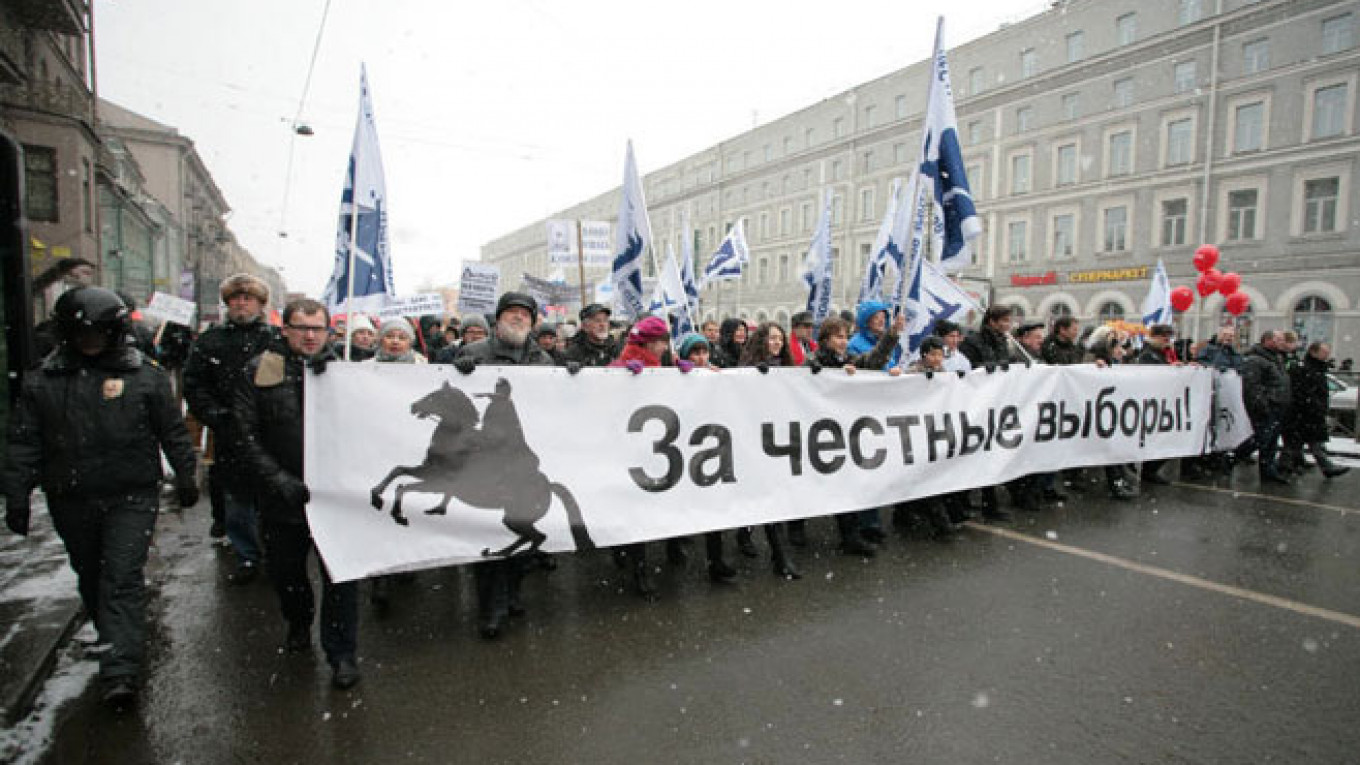With State Duma elections only 18 months away, several questions arise. How can Russia achieve truly democratic elections? Will the authorities make good on their threat to bar the real opposition from participating? Will government officials manipulate the elections as they have done in the past?
Keep in mind that manipulation of the election results is more than simply falsifying the tally on voting day. Even the most careful control of the count means little if the opposition is not permitted to participate in the elections.
The State Duma elections of 2011 were typical in this regard. It turned out that the authorities were not content with United Russia simply earning a certain percentage of the votes.
We must accept the obvious fact that the overwhelming majority of Duma deputies from all parties — including those that list themselves as oppositional — eventually took unambiguously pro-presidential positions on all the key issues.
In the 2011 elections, the authorities clearly failed to win a high percentage of the vote for the ruling party, but in a practical sense, they achieved complete victory by forming an ultra-loyal parliament. The presidential elections in 2012 were even more instructive because not a single candidate participated who was openly critical of then-Prime Minister Vladimir Putin.
As with State Duma elections, the authorities did not struggle with the opposition, but worked to achieve the highest possible percentage of votes for the foregone winner. And they achieved that goal because they allowed only those candidates to run that nobody voted for, except out of frustration.
Those who believe the opposition refused without good reason to participate in presidential elections do not understand that leaders had thrown up bureaucratic hurdles to entering the race. These hurdles were impossible to surmount without help from the very authorities who were blocking the way.
Mandating a certain number of voter signatures for a candidate to qualify is perhaps the most reliable way for the state to control who participates, because officials can always claim that signatures were falsified. As an example, this approach was used to disqualify Mikhail Kasyanov in 2008.
Thus, the main question in the run-up to the 2016 elections is whether President Vladimir Putin — who in fact personifies the Russian state — is prepared to allow the participation of opposition candidates who are outspoken critics of his rule?
If not, then any strategy or plan is a clear waste of time, energy and resources: In today’s Russia it is practically impossible to force the authorities to allow parties and candidates they consider undesirable to participate in elections.
Is it possible that Russia would hold democratic elections with the participation of all political forces? Theoretically, yes, but it would be a mistake to expect too much from the results.
For example, civil society leaders could initiate public and transparent talks with the government on whether the real opposition will be allowed to participate in the upcoming elections.
If the government does not want to enter into such negotiations, and definitely does not want to publicly provide any guarantees that it will register opposition candidates and give them equal access to voters, then it would make sense for the opposition to consider boycotting the elections.
It is possible that the threat of an organized boycott by the opposition and an ongoing battle — both within Russia and internationally — against recognizing the results of one-sided elections, would prove the most effective means for applying pressure on the authorities.
Fyodor Krasheninnikov is the president of the Institute for Development and Modernization of Public Relations in Yekaterinburg. This comment originally appeared in Vedomosti.
A Message from The Moscow Times:
Dear readers,
We are facing unprecedented challenges. Russia's Prosecutor General's Office has designated The Moscow Times as an "undesirable" organization, criminalizing our work and putting our staff at risk of prosecution. This follows our earlier unjust labeling as a "foreign agent."
These actions are direct attempts to silence independent journalism in Russia. The authorities claim our work "discredits the decisions of the Russian leadership." We see things differently: we strive to provide accurate, unbiased reporting on Russia.
We, the journalists of The Moscow Times, refuse to be silenced. But to continue our work, we need your help.
Your support, no matter how small, makes a world of difference. If you can, please support us monthly starting from just $2. It's quick to set up, and every contribution makes a significant impact.
By supporting The Moscow Times, you're defending open, independent journalism in the face of repression. Thank you for standing with us.
Remind me later.






